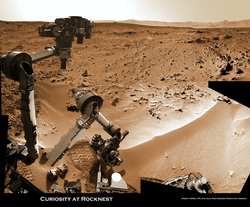
Not exactly the "holiday" present we astronomy/science geeks were waiting for. NASA's announcement of "possible" martian organics discovered by the Curiosity rover left room for apparent doubt.
But that's what the Scientific Method is all about. Leave enough room - in terms of saying maybe - just in case you need to CYA later if the current new evidence proves even slightly (like .02%) suspect later down the line.
Kinda like making a 50/50 bet so you never seem to collect the $200 & Pass Go.
Or risk becoming a Meteorologist (just kidding!)
Patience....patience. The scientific method may seem boring and/or slow but it DOES work........eventually.
Take a look at the overall data of past & current Mars surface missions. All have chemically analyzed soils/rocks in about the same way. Viking I & II were specifically sent to look for microbial life in the martian soil - and had very interesting results in 1976. Ultimately most scientists agreed that life "most likely" - again a hedge 50/50 bet - did not exist on Mars based on the Viking experiments back then.
NASA Curiosity project scientists want to be sure about their results as scientifically as possible - and also to CYA just in case. Remember the Mars Allan Hills 84001 meteorite/fossil debate in 1999?
One last note: spending 2.5 Billion on a "super rover" to Mars - you would think that any and all possible "contaminants" like Earth-organics would be a non-argument. Especially how NASA completely sterilizes anything going to the outer reaches of the Solar System like Jupiter, Saturn & Pluto. Let alone a planet like Mars - the most Earth-like in the Solar System that early-on once had oceans like Earth.
But that's what the Scientific Method is all about. Leave enough room - in terms of saying maybe - just in case you need to CYA later if the current new evidence proves even slightly (like .02%) suspect later down the line.
Kinda like making a 50/50 bet so you never seem to collect the $200 & Pass Go.
Or risk becoming a Meteorologist (just kidding!)
Patience....patience. The scientific method may seem boring and/or slow but it DOES work........eventually.
Take a look at the overall data of past & current Mars surface missions. All have chemically analyzed soils/rocks in about the same way. Viking I & II were specifically sent to look for microbial life in the martian soil - and had very interesting results in 1976. Ultimately most scientists agreed that life "most likely" - again a hedge 50/50 bet - did not exist on Mars based on the Viking experiments back then.
NASA Curiosity project scientists want to be sure about their results as scientifically as possible - and also to CYA just in case. Remember the Mars Allan Hills 84001 meteorite/fossil debate in 1999?
One last note: spending 2.5 Billion on a "super rover" to Mars - you would think that any and all possible "contaminants" like Earth-organics would be a non-argument. Especially how NASA completely sterilizes anything going to the outer reaches of the Solar System like Jupiter, Saturn & Pluto. Let alone a planet like Mars - the most Earth-like in the Solar System that early-on once had oceans like Earth.
 RSS Feed
RSS Feed
